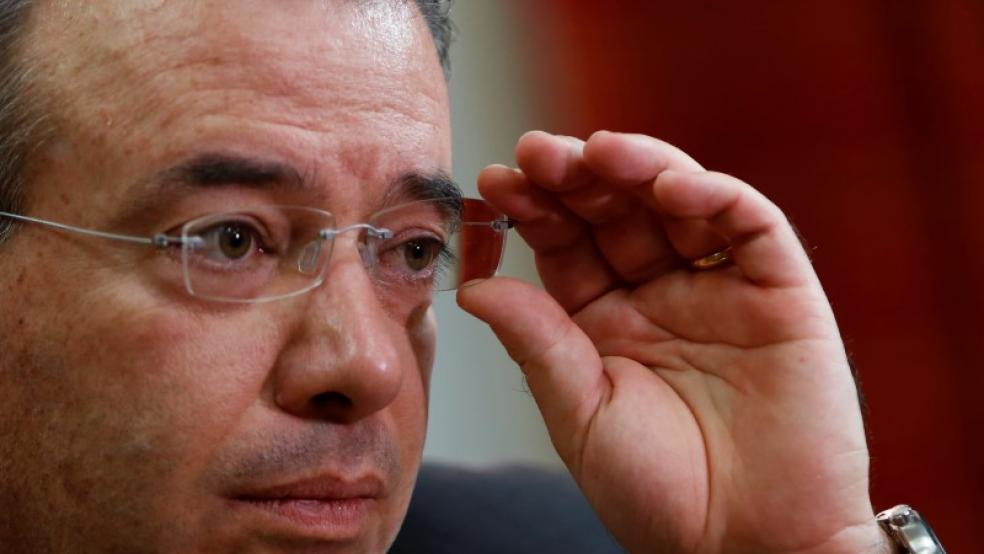MEXICO CITY (Reuters) - Mexico's incoming central bank governor Alejandro Diaz de Leon on Tuesday said inflation may not fall as forecast because of recent and future shocks, laying out a cautious stance that may bode for steady or even higher interest rates ahead.
In his first interview after being nominated to replace Agustin Carstens earlier on Tuesday, Diaz de Leon warned the inflation outlook deteriorated in recent months, citing the U.S. Federal Reserve's monetary position and Mexico's tight labor market.
He told Reuters the bank's main challenge was to get inflation back down to its 3 percent target after a spike this year above 6 percent.
Inflation unexpectedly rose in early November after falling from a 16-year high in August and the peso weakened sharply in October over concerns the United States could end a free trade deal with Mexico.
Yale-educated Diaz de Leon, 47, emphasized that monetary policy would be driven by data, saying the central bank board would focus on the most recent information, right up to the day of policy meetings, before making a decision.
"In the last months we have been quite clear to highlight that we have been facing the shocks that I have alluded to and we are still not free from potential additional shocks," said Diaz de Leon, whose term begins Dec. 1.
"We cannot assume that the disinflationary path will necessarily go as expected," he added.
The central bank holds its next monetary policy meeting Dec. 14 with a few private economists predicting a hike from the current 7 percent benchmark interest rate after several months with no changes.
Yields on interest rate swaps are pointing to further interest rate hikes early next year.
"Any central bank would like to have the wisdom of an owl, rather than the other two extremes," he said, indicating ahead of the next policy meeting that his stance would be neither dovish or hawkish.The governor said the bank's mandate was to fight inflation, countering some economists' views that the former finance ministry official might be more concerned about growth."We believe that by achieving that mandate we have a very important contribution in fostering growth," he said.The central bank last week trimmed its growth forecast for 2017 to between 1.8 percent and 2.3 percent, in part due to the impact on investment from worries about the future of the North American Free Trade Agreement (NAFTA). Talks to rework the pact that underpins $1 trillion in trade have stalled.U.S. President Donald Trump has threatened to dump NAFTA if he cannot renegotiate it in his country's favor. Diaz de Leon said the bank was not working on the assumption the deal would fail."In our central scenario, the free trade agreement continues and if there is a deviation from that central scenario, the economy is resilient and the policies that have been put in place have made the economy more resilient," he said.INSIDERDiaz de Leon started his career with a 16-year stint at the central bank, before moving into government. He was ratified by the Senate last December to replace inflation hawk Manuel Sanchez on the central bank board and his nomination to now lead the bank will not require another vote by lawmakers.Following Carstens' exit, Mexican President Enrique Pena Nieto will need to name a new member of the board.Before joining the board, Diaz de Leon had run the government's export bank Bancomext from 2015 until late last year, and before that served as the head of the finance ministry's public debt office. He was a principal figure in selling Pena Nieto's economic reform agenda in 2013 and 2014 to global investors.A Reuters poll in February found economists thought Diaz de Leon was the most likely replacement for Carstens. The poll also found that Miguel Messmacher, a finance ministry deputy, was considered the mostly likely person to be named as the new fifth member of the board."So clearly the message of prudence and (being) very cautious in terms of what is the outlook for inflation is going to be one of the main things here that we all share, in terms of one of the challenges going forward," Diaz de Leon said of the board's stance. (Reporting by Anthony Esposito; Writing by Michael O'Boyle; Editing by Frank Jack Daniel and Grant McCool)



